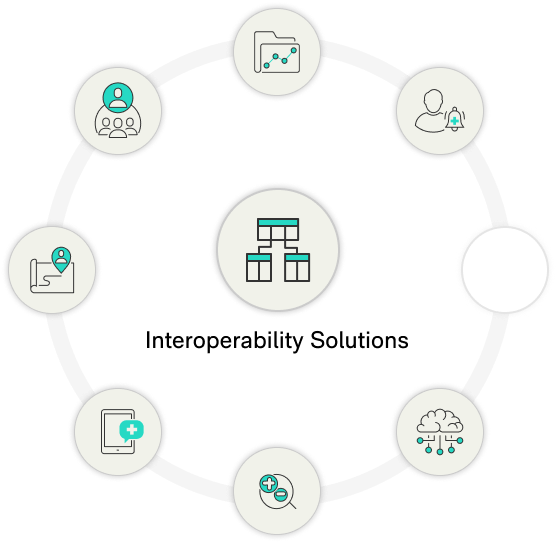What are custom interoperability solutions in healthcare?
Custom interoperability solutions enable different healthcare systems and applications to communicate and exchange data seamlessly, improving care coordination and operational efficiency.
Streamline healthcare by enabling seamless data exchange between systems, reducing costs, and improving care outcomes. These solutions enhance efficiency, ensure real-time access to patient data, and support better decision-making. Partner with us to drive greater efficiency.

Custom interoperability solutions enable seamless data exchange between telehealth platforms and healthcare systems using APIs and standardized formats like HL7 and FHIR. This integration allows telemedicine, telepharmacy, telecardiology, and other remote services to access and update patient records in real-time during consultations. This saves time and costs for patients and providers, and ensures continuity of care.
Integrating continuous monitoring devices such as wearables and IoT sensors with chronic disease management platforms and EHRs allows for real-time data exchange and analytics. This facilitates personalized monitoring and timely interventions for conditions like diabetes and hypertension. These solutions offer significant cost savings and improved patient outcomes.
Connecting post-discharge monitoring systems with hospital discharge planning tools and home healthcare services ensures continuous, personalized monitoring aligned with recovery goals. Secure data exchange protocols provide real-time updates and alerts on patient status, enabling timely interventions. This reduces readmissions and lowers costs.
Linking remote cardiac monitoring devices with cardiac care management systems and EHRs through secure data protocols ensures real-time data integration and analytics. This allows for precise monitoring and timely interventions for arrhythmias and heart failure. This leads to better patient outcomes and cost savings.
Integrating predictive analytics tools with clinical decision support systems and patient management software aggregates data from EHRs, wearables, and external databases. Machine learning models analyze this data to provide healthcare providers with actionable insights for personalized care. This helps anticipate and mitigate potential health issues.
A large value-based care provider, faced CMS reimbursement challenges due to coding gaps. Complex growth and tech hindered patient care. Addressing gaps was vital for improved patient care and reimbursement.

We put a new product or service in your user’s hands…so you can start learning and building your business.
Understand the business problem, user needs, and key objectives. Validate the product concept and define the vision.
Product strategy + prioritized features
Define the product or service to solve the problem. Define technical architecture, user flows, wireframes, and visual design.
Project roadmap, technical specs, design assets, prototype
Develop the MVP through iterative sprints, incorporating user feedback and testing. Deliver core functionality to meet business goals.
MVP ready for market test & user validation
Post-launch, focus on scaling and optimizing based on user feedback and analytics. Add users and commercialize the product.
New features, enhancement, business growth
Ensuring seamless integration with existing healthcare systems, such as EHRs, EMRs, telehealth platforms, and other healthcare databases, is crucial for efficient data exchange and workflow integration. This involves overcoming technical barriers and ensuring compatibility across diverse systems to enable continuous and comprehensive monitoring and data sharing.
Custom interoperability solutions must be scalable to accommodate a large number of users and handle increased data volumes from multiple sources without compromising performance. Ensuring the system can grow with the organization’s needs and maintain optimal performance under varying usage conditions requires advanced infrastructure and sophisticated software design.
Protecting patient privacy and ensuring data security are paramount. This requires robust encryption, access controls, and compliance with regulatory standards like HIPAA and GDPR. Implementing comprehensive security measures and data privacy protocols to maintain confidentiality and integrity is essential but challenging in a highly regulated environment.
Implementing rules engines for the automation of decision-making processes based on predefined clinical guidelines and protocols is crucial. This helps maintain consistency, improve efficiency, and ensure adherence to best practices across the healthcare system. However, developing and maintaining these engines requires significant expertise and continuous updates to reflect evolving medical knowledge and regulations.
The solution should allow for customizable alerts and notifications based on individual patient parameters. This ensures timely interventions by healthcare providers when abnormal readings or trends are detected. Developing a flexible and responsive alert system that can adapt to a wide range of clinical scenarios and patient needs is complex and resource-intensive.
Integrating workflow management capabilities to streamline and coordinate healthcare processes is essential for enhancing efficiency. Workflow managers help in managing patient care pathways and optimizing resource allocation. Developing a system that can adapt to the varied and dynamic workflows of different healthcare providers and institutions is a significant challenge, requiring deep understanding and customization.

Expertise in collecting and aggregating data from EHRs, medical devices, telehealth platforms, and external databases, ensuring accurate and comprehensive data exchange.
Proficiency in cleaning, transforming, and preprocessing raw data, including tasks like missing data imputation and normalization, to maintain data integrity and suitability for analysis.
Skill in designing real-time, customizable alert systems based on patient parameters to notify healthcare providers of significant changes or risks, enabling timely interventions.
Capability in creating interactive, user-friendly dashboards for healthcare professionals, facilitating easy access, visualization, and interpretation of patient data through real-time charts and comprehensive reports.
Knowledge in implementing robust security measures, including encryption and access controls, to protect patient information and ensure compliance with healthcare regulations like HIPAA and GDPR.
Experience in designing scalable solutions that handle increased data volumes and user numbers without compromising performance, ensuring the system grows with organizational needs.

Expertise We specialize in integrating diverse healthcare systems, ensuring accurate and comprehensive data exchange to enhance patient care and operational efficiency.

Our solutions prioritize robust security measures and strict compliance with HIPAA and GDPR, protecting patient information and avoiding legal penalties.

With a proven track record, we deliver high-quality, scalable, and user-friendly solutions that improve patient outcomes and provider efficiency.
Launch a new service or product in as little as 8 weeks
Consulting services for technology integration in Value-Based Care.
An evaluation to guide critical business strategies and decisions.
Custom interoperability solutions enable different healthcare systems and applications to communicate and exchange data seamlessly, improving care coordination and operational efficiency.
By ensuring seamless data exchange between systems, interoperability solutions provide healthcare providers with comprehensive and up-to-date patient information, leading to better-informed decisions, timely interventions, and improved patient outcomes.
Interoperability solutions integrate data from electronic health records (EHRs), lab results, imaging systems, wearable devices, and other healthcare databases to create a unified view of patient information.
Interoperability solutions enable better care coordination and follow-up by ensuring all relevant patient information is available to healthcare providers, reducing the risk of errors and improving the management of post-discharge care.
Challenges include ensuring data privacy and security, integrating data from multiple sources, maintaining data accuracy and quality, and achieving buy-in from healthcare providers and organizations.
Yes, by improving data sharing and care coordination, interoperability solutions can reduce duplicative tests, minimize errors, and enhance resource allocation, ultimately helping to manage healthcare costs more effectively.
Interoperability solutions provide a seamless flow of information across different healthcare systems and providers, ensuring that all parties have access to the same accurate and timely patient data, thus enhancing care coordination.
Common standards include HL7 (Health Level Seven), FHIR (Fast Healthcare Interoperability Resources), and DICOM (Digital Imaging and Communications in Medicine), which facilitate the exchange of health information across different systems.
Interoperability solutions implement robust security measures such as encryption, secure APIs, and compliance with regulations like HIPAA to protect patient data during exchange and storage.
Custom interoperability solutions are tailored to meet specific organizational needs, ensuring seamless integration with existing systems, better alignment with workflows, and greater flexibility in addressing unique challenges and requirements.